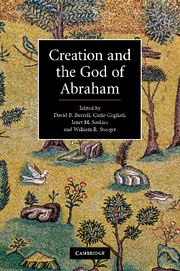Book contents
- Frontmatter
- Contents
- Contributors
- Preface
- Introduction
- 1 Creation ex nihilo: early history
- 2 Creatio ex nihilo: its Jewish and Christian foundations
- 3 The act of creation with its theological consequences
- 4 Scotistic metaphysics and creation ex nihilo
- 5 Creation and the context of theology and science in Maimonides and Crescas
- 6 Creation: Avicenna's metaphysical account
- 7 Four conceptions of creatio ex nihilo and the compatibility questions
- 8 Will, necessity and creation as monistic theophany in the Islamic philosophical tradition
- 9 Trinity, motion and creation ex nihilo
- 10 The Big Bang, quantum cosmology and creatio ex nihilo
- 11 What is written into creation?
- 12 Creatio ex nihilo and dual causality
- 13 God and creatures acting: the idea of double agency
- 14 Thomas Aquinas on knowing and coming to know: the beatific vision and learning from contingency
- Index
- References
1 - Creation ex nihilo: early history
Published online by Cambridge University Press: 07 September 2010
- Frontmatter
- Contents
- Contributors
- Preface
- Introduction
- 1 Creation ex nihilo: early history
- 2 Creatio ex nihilo: its Jewish and Christian foundations
- 3 The act of creation with its theological consequences
- 4 Scotistic metaphysics and creation ex nihilo
- 5 Creation and the context of theology and science in Maimonides and Crescas
- 6 Creation: Avicenna's metaphysical account
- 7 Four conceptions of creatio ex nihilo and the compatibility questions
- 8 Will, necessity and creation as monistic theophany in the Islamic philosophical tradition
- 9 Trinity, motion and creation ex nihilo
- 10 The Big Bang, quantum cosmology and creatio ex nihilo
- 11 What is written into creation?
- 12 Creatio ex nihilo and dual causality
- 13 God and creatures acting: the idea of double agency
- 14 Thomas Aquinas on knowing and coming to know: the beatific vision and learning from contingency
- Index
- References
Summary
INTRODUCTION
That God created the universe ‘from nothing’ (ex nihilo) has been a distinctive Christian claim almost from the beginning. The phrase is, on the face of it, an odd one: it is as though ‘nothing’ were a sort of ghostly raw material for the divine act of creating. But the ‘ex nihilo’ phrase long ago was accepted as a shorthand way of saying: ‘from no prior materials’. The doctrine itself only gradually took shape over more than a thousand years. In this chapter, I propose to sketch in broad outline some of the main features of that long gestation period. It lends itself readily to a threefold division: creation in the Old Testament; creation ex nihilo in the early Christian Church; creation of ‘all together’ in St Augustine.
CREATION IN THE OLD TESTAMENT
The majestic chapters with which the Bible opens could easily give the impression that cosmogony, the question of cosmic origins, was of major concern from the beginning to the writers of the Old Testament. But this was by no means the case. The two ‘creation’ chapters date from very different periods of Israel's history. Genesis 2, much the older, dates back perhaps as far as the tenth-century-bc Israel of David and Solomon. It deals primarily with the origin of man and woman, and the role of Yahweh in their making. Though Yahweh is said to have already made the heavens and the earth, nothing more is added about cosmic origins.
- Type
- Chapter
- Information
- Creation and the God of Abraham , pp. 11 - 23Publisher: Cambridge University PressPrint publication year: 2010
References
- 1
- Cited by



